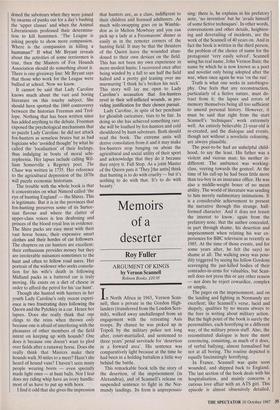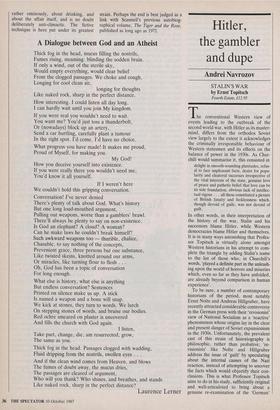Memoirs of a deserter
Roy Fuller
ARGUMENT OF KINGS by Vernon Scannell
Robson Books, £10.95
In North Africa in 1943, Vernon Scan- nell, then a private in the Gordon High- landers (transferred from the London Scot- tish), walked away unchallenged from an engagement with the retreating Axis troops. By chance he was picked up in Tripoli by the military police not long after, court-martialled, and sentenced to three years' penal servitude for 'desertion in a forward area'. His sentence was comparatively light because at the time he had been in a holding battalion a little way behind the battle.
This remarkable book tells the story of the desertion, of the imprisonment (in Alexandria), and of Scannell's release on suspended sentence to fight in the Nor- mandy landings. Its form is unpreposses- sing: there is, he explains in his prefatory note, 'no invention' but he 'avails himself of some fictive techniques'. In other words, conversations and other details, heighten- ing and dovetailing of incidents, are the work of the Scannell of 40 years on. And in fact the book is written in the third person, the problem of the choice of name for the protagonist 'very easily solved', Scannell using his real name, John Vernon Bain; the name by which he is now known as a poet and novelist only being adopted after the war, when once again he was 'on the run'.
Truth is what one seeks in autobiogra- phy. One feels that any reconstruction, particularly of a fictive nature, must de- tract from it; the lapses and errors of memory themselves being all too sufficient to amend personal history. However, it must be said that right from the start Scannell's 'techniques' work extremely well. An entirely believable 21-year-old is re-created, and the dialogue and events, though not without a novelistic colouring, are always plausible.
The poet-to-be had an unhelpful child- hood, to say the least. His father was a violent and vicious man; his mother in- different. The ambience was working- class, veering towards the genteel. At the time of his call-up he had been little more than tea-boy in an insurance office. He was also a middle-weight boxer of no mean ability. The world of literature was sending to him merely rudimentary intimations. It is a considerable achievement to present the narrative through this strange, half- formed character. And it does not lessen the interest to know, again from the prefatory note, that the author concealed, in part through shame, his desertion and imprisonment when relating his war ex- periences for BBC television as recently as 1985. At the time of those events, and for some years after, he felt (he says) no shame at all. The walking away was poss- ibly triggered by seeing his fellow Gordons scavenging the just-killed bodies of their comrades-in-arms for valuables, but Scan- nell does not press this or any other reason — nor does he reject cowardice, complex or simple.
The pages on the imprisonment, and on the landing and fighting in Normandy are excellent; like Scannell's verse, lucid and shapely, qualities by no means always to the fore in writing about military action. But the high point of the book is surely the personalities, each horrifying in a different way, of the military prison staff. Also, the reconstituted dialogue is here the most convincing, consisting, as much of it does, of verbal bullying, almost formalised but not at all boring. The routine depicted is equally fascinatingly horrifying.
In France, Scannell was quite soon wounded, and shipped back to England. The last section of the book deals with his hospitalisation, and mainly concerns a curious love affair with an ATS girl. This episode is almost obsessively detailed, rather ominously, about drinking, and about the affair itself, and is no doubt deliberately anti-climactic. The fictive technique is here put under its greatest strain. Perhaps the end is best judged as a link with Scannell's previous autobiog- raphical volume, The Tiger and the Rose, published as long ago as 1971.



























































 Previous page
Previous page